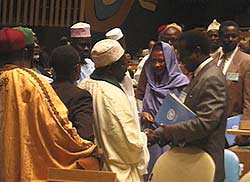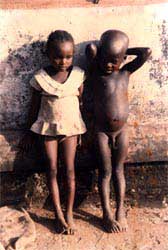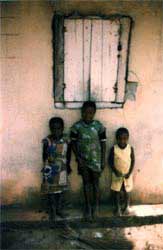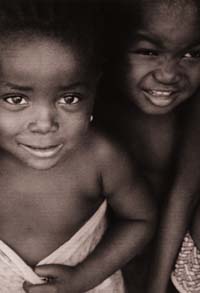|
\ Condensed from the Bangkok Post: |
 African Delegates, General Assembly © Alan Geoghegan |
THE INTERNATIONAL CAMPAIGN TO REDUCE THIRD WORLD DEBT: (This is an Archive from1999-2005)
please visit Third World Debt (this page,1999-2000), more debt (this page, 2000), march debt (2000-2001) and 2005 Debt.
Jubilee Debt Coalition (Drop The Debt) is a coalition of national organisations and local groups around the UK, calling for the unpayable debts of the poorest countries to be cancelled. The Coalition is also known as Jubilee Debt Campaign and focuses on developing countries' debt. They were active between 2000-2005.
The Coalition was formed as a successor organisation to the Jubilee 2000 Coalition. The name was chosen in 1995/6, as preparations were gathering pace for the celebration of the millennium. The concept was that justice and poverty alleviation through the cancellation of debts would be a fitting celebration for the millennium. The concept of debt cancellation and celebration is linked to the Old Testament concept of Jubilee, which meant that every 50 years, people sold into slavery, or land sold due to bankruptcy, were redeemed. The key aim of JDC is debt cancellation and the alleviation of poverty. Educational and campaign materials have been produced on the legitimacy of debt, power and corruption of both lenders and borrowers. (wikipedia.org)
|
\ Condensed from the Bangkok Post: |
 African Delegates, General Assembly © Alan Geoghegan |

UN Headquarters © Alan Geoghegan |
As the birthplace of mankind continues to suffer a fate worse than imperialism, the UN Security Council launches an unprecedented initiative to stop the rot Richard Holbrooke, US ambassador to the United Nations, is currently chairman of the UN Security Council. Holbrooke is also the likely Secretary of State if Vice President Al Gore wins the American election next November. He spoke with Global Viewpoint editor Nathan Gardels at the United Nations recently. GARDELS: Olusegun Obasanjo, the newly elected president of Nigeria, argues that debt relief for Africa by the advanced countries is every bit as important to the success of democracy in Africa today as sanctions against apartheid South Africa were in the past. What can be done? HOLBROOKE: I agree with President Obasanjo. So does President Clinton, who is personally and passionately committed to relieving the debts built up in Africa, including Nigeria, under past dictatorships. |
This year, President Clinton only got about one-third of the debt relief appr ovals from the US Congress that he sought. But we are not going to give up on that. We will keep plugging away. However, we will not give debt relief to countries that will simply use it to shore up their military budgets. American taxpayers will not extend debt relief to dictators who use it to repress their own people.
|
Condensed from Knight-Ridder/Tribune Business News |

|
Just like a consumer drowning in credit card bills and other debts, some poor nations are sinking under the weight of old loans, social justice activists believe.
While a desperate individual can declare bankruptcy, nations don't have that option. But now religious groups around the world are calling on lenders to give these countries a fresh start, too. Called Jubilee 2000, the campaign is trying to convince the World Bank, International Monetary Fund and various governments to celebrate the new millennium by writing off the debts of countries like Haiti, Bolivia and Bangladesh.
The struggling borrowers, mostly in Africa and South America, were trapped, Jubilee 2000 says, in a complex web of changing interest rates, worldwide recession, dropping revenue from exports, high oil prices, corrupt leaders and unscrupulous lenders pushing easy cash. Some have repaid the principal and are struggling to make the interest payments. However,
Siding with the debtors The debt forgiveness campaign isn't widely known in the religious community here, but it has drawn some heavy hitters, including Pope John Paul II, evangelist Billy Graham, rock star Bono and the World Council of Churches, to name a few. The Heritage Foundation and the Rev. Pat Robertson have also endorsed the idea, said Bryden. "These are not flaming liberal thinkers."
|
|
From Asahi Shimbun (Japan):
Debt Relief Sure Proof of an International Outlook By Bono Jan 27, 2000
|
|
The sun has risen on a new millennium and just as Japan's time zone meant it was the first major economic power to welcome the new age, so it can lead the way as the first chair of the Group of Eight in the 21st century. It is a big moment and it needs a big idea to fill it. The good news is, we've got one. The idea is Jubilee 2000: the campaign to cancel the unpayable debts of the very poorest countries to the very richest. It's a big idea because if it continues to catch on over the next year it will substantively touch the poor, those living on less than a dollar a day. At last year's G-8 summit the world's leaders established a principle that forever alters the relationship between the developed and developing worlds. That principle decries the repayment of old loans above the feeding, educating and inoculating of destitute people.
 Mamour "Ba" of Senegal , ©Alan Geoghegan |
If those leaders can turn rhetoric into reality, over $100 billion (10.5 trillion yen) in debt will be canceled, subject to strict conditions. Jubilee 2000 would like twice that, but for now we're celebrating. A movement not given much hope less than a year ago has not just raised consciousness -- it has raised the stakes to sums previously unimagined. Jubilee 2000 has been successful for a few reasons. There's the date. It's a one off. But without a big idea, it's hubris and hangovers we're all waking up with, not a new dawn. There's its breath of support from Pope John Paul to David Bowie, from Tanzania to Bolivia, from Harvard to Rowan "Mr. Bean" Atkinson. |
|
you can elevate too... |
|
|
Condensed from Q magazine: Bono begs French to drop the debt Jan. 24, 2000 11:21AM |
 Fish Boy, Manila © Alan Geoghegan |
Bono took advantage of his presence at France's NRJ Music Awards on Saturday to ask for help in cancelling Third World Debt. The U2 frontman received the Man of the Year award at the glitzy ceremony in Cannes, where he immediately took advantage of his time on stage to highlight drop-the-debt charity Jubilee 2000.
He said, "This award is not for me, not for
the man, but for the idea. The idea is Jubilee 2000. It wants to stop
the poorest countries on the planet repaying all the loans to the
richest countries on the planet rather than feeding, inoculating and
|
|
Irish rock superstar and political activist Bono seems to enjoy a very close relationship with the Leader of the Free World. "It is an extraordinary thing to see your administration so fast on its feet," Bono wrote Bill Clinton recently, referring to the president's speech at the World Bank in September announcing full debt forgiveness of loans to poor countries.
In a thank-you note just before New Year's Eve, Bono wrote that World Bank President "Jim Wolfensohn had told me [Treasury Secretary] Larry Summers would never agree to a hundred percent forgiveness of loans to the HIPCs." HIPCs, called "hippics" by true insiders, stands for heavily indebted poor countries.
National Economic Council chief "Gene Sperling had said the issue was a priority, but there were many obstacles . . . and much red tape," Bono said in the letter, which was addressed to "Mr. President, Bill."
"Enter The Presidential Scissors and it is now forever a moral as well as economic imperative that a starving man feed his children before repaying his old loans," Bono gushed.
|
Posted on the Jubilee 2000 UK Web Site At a formal UN-backed meeting in Bangkok, 250 (mostly Asian) NGOs gathered on the 7-9th February to draft a joint statement presented to world leaders at the UNCTAD X meeting in Bangkok, Thailand. The UNCTAD X meeting on the 12th-19th February was the first international forum since the debacle of the Seattle WTO meeting. As a result media and government attention focussed on the activities of non-governmental participants from around the world; and on the daily protests against the IMF and World Bank staged outside the Conference by Thai environmentalists, farmers and workers &endash; notably women workers. |

Asian sunset © Alan Geoghegan |

Manila Squatters © Alan Geoghegan |
In their joint statement "UNCTAD and Civil Society: towards our common goals" a call was made for a "New Deal premised upon fundamental resolution of the debt crisis". The statement rejected the Highly Indebted Poor Country (HIPC) initiative "and the repacking and perpetuation of the IMF and the World Bank structural adjustment programmes under the guise of the growth and poverty reduction facility". NGOs supported "the move to build an international alliance among governments and civil society that would press for a new arrangement for the cancellation of all debt of developing countries, which, in the judgement of civil society, is illegitimate, immoral or unpayable". |
|
They called for "control of the process dealing with debt to be removed from the hands of creditors, including the IMF, the World Bank and the Paris Club (of western government creditors). A new independent, transparent arrangement accountable to civil society must be put in place. Such an arrangement must ensure full restitution and reparation from those responsible for the human, social, political and environmental damage inflicted on developing countries and peoples." At a subsequent series of meetings co-ordinated by Thai NGOs, representatives from around the world were briefed on the devastating impact of IMF policies in Thailand during the economic crisis of 1997. The IMF, led by Mr. Camdessus, then effectively demanded the nationalisation of the debts, and the transfer of losses to Thai taxpayers. "This is a deep injustice inflicted on the Thai people; a form of theft" said Ann Pettifor of the UK Jubilee 2000 Coalition in an interview with Thai TV. The presence of Mr. Camdessus at the conference, as a guest of Mr. Ruben Ricupero, Secretary General of UNCTAD, caused rising anger amongst Thai people, whose courtesy and hospitality towards guests is renowned. At a demonstration on the opening day of the Conference, Thai women workers, bearing banners calling on the WTO, IMF and WB to "go to hell", confronted a line of heavily armed police outside the conference hall. NGOs at UNCTAD also prepared the "Bangkok Appeal to the people of the world". |

Asian water-boy Muntinlupa Development Foundation, Manila © Alan Geoghegan -Thailand is now paying back $13bn a quarter in debt repayments to creditors that made reckless loans to private institutions before 1997 |
|
This appeal called for "strengthened international co-operation in mobilising social movements in support of the cancellation of debt; to end the IMF's structural adjustment policies in indebted nations; for a moratorium on any new negotiations that would increase the power and scope of the WTO; and to exclude from the jurisdiction of the WTO such issues as peasant agriculture, social services and intellectual property claims; and to impose controls and taxes on capital". The Bangkok Appeal is a call for unity around these issues, and for a deepening debate "in order to articulate and promote common alternatives". Above all, the Bangkok Appeal is a call for all social movements to unite and mobilise in large numbers in support of the issues outlined above. The appeal draws attention to a series of key dates for taking action. Firstly it was noted that there is to be a week of protest in Washington, beginning with the Jubilee 2000 debt march and rally on the 9th April, and continuing through that week to the16th. |
Moses in Kepeteh Village, Sierra Leone, © Alan Geoghegan |
MOZAMBIQUE DEBT
NEWS
President Chissano of Mozambique calls for immediate debt cancellation MARCH 3 From Jubilee 2000 UK The growing call for immediate debt cancellation for flood-stricken Mozambique has been heightened by a strong public appeal by the Mozambican government urging creditors to cancel all of the country's debts. Having repeatedly appealed for emergency aid, President Joachim Chissano drew attention to the importance of debt cancellation for Mozambique's long-term reconstruction. Speaking to Reuters, Foreign Minister Leonardo Simao claimed that previous debt relief was inadequate given the scale of the crisis. |
|
Simao said: "The time has come for the world to take the most needed
additional step, which is the complete forgiveness of our
debt. This will help us also to devote our resources for
rebuilding the country and to provide needed services to the
population."
Mozambique owed $8.3 billion in 1998, and despite some debt relief last June is still paying $1.4 million a week in debt repayments. Even after further relief planned for next month, it will still pay almost $1 million each week. Jubilee 2000 has publicly called for total debt cancellation, as money is urgently needed to stay in the country where it will be needed for the reconstruction effort. Bishop Bernardino Mandlate, of the Mozambique Debt Group, commented: "More than ever before, we call on the international community to cancel our debt immediately so that our country can concentrate on reconstruction of the lives of those affected and of the destroyed infrastructures. It is unthinkable that the country can continue to drain itself of the much needed resources at this point in time to service the debt which we believe that morally and even financially has already been paid back. " Last week, Graca Machel, former First Lady of Mozambique and UNICEF Ambassador urged Mozambique's creditors to cancel 100% of its debts, echoing a call by the international Jubilee 2000 movement who have been putting pressure on creditors. Aid agencies such as Oxfam, Christian Aid, Save the Children Fund and CAFOD have also called for cancellation. |

Sister & Brother © Alan Geoghegan |
 Sierra Leone sisters © Alan Geoghegan |
The British Government responded to the political pressure by announcing that the government would stop collecting debt payments and cancel 100% of bilateral debts. So far, the UK is the only creditor to officially promise to cancel bilateral debts owed by Mozambique. Other creditors - the biggest being the IMF and World Bank, France, Italy, Brazil and Russia - are under growing pressure to respond. Mozambique pay out $1.4 million a week in debt repayments despite devastating floods Mozambique, hit by the worst floods in 30 years, is having to pay $1.4 million a week in debt service, the Jubilee 2000 Coalition revealed in a statement to the press on 23rd February. Mozambique has hit the headlines, following devastating floods which first hit Southern Africa 3 weeks ago. So far, over a million people have been directly affected as homes have been obliterated and hundreds of thousands of acres of agricultural land and crops have been destroyed. The situation is likely to get worse, as a new cyclone Eline hits the country this week. The international community has started to respond. However as international aid starts to drip in, dollars are still pouring out to make payments owed on debt service. The UK has so far promised $1.2million (£765,000) in aid. However Mozambique pays out this amount each week in debt service to the international community. |

on the Banka, River #2, near Freetown © Alan Geoghegan |
Mozambique had already shown that it would spend resources generated from debt relief on poverty reduction, or it would not have received HIPC debt relief in the first place.
Jubilee 2000 calculates that even with this extra relief Mozambique will still pay out an average $1.2 million a week in debt repayments - resources that are now needed in the country more desperately than ever. Apart from the physical destruction of infrastructure and farmlands, there is a serious health risk in Mozambique as epidemics of water-related diseases begin to spread. Additionally, there is the threat of land-mine displacement (a legacy from the 16-year civil war). The long-term implications of the floods for the economy are catastrophic. Before the crisis broke, Mozambique's President Joaquim Chissano repeatedly called for total debt cancellation. Mozambique has followed severe IMF economic reforms for many years since emerging from a brutal civil war. It is considered by the international community to be a 'success story' as it has constructed a solid democracy which has shown steady economic growth over the past few years. |

West African
mother
MOZAMBIQUE DEBT FACTS: • Total debt owed in1998: $8.3 billion • Bilateral debt: $4.3 billion • Multilateral debt: $2.1 billion • Private debt: $2.0 billion |
Jubilee 2000 has called on creditors:
• To stop taking payments now. Mozambique desperately needs to keep the dollars it currently pays out. • To urgently agree the cancellation of all debts for Mozambique. Ann Pettifor, director of Jubilee
2000 said: The delay in debt relief for a
country like Mozambique has exposed again the inadequacies
of the Cologne debt initiative. Despite grand promises made
by the creditors, the initiative is moving forward at a very
slow pace, has failed to deliver adequate amounts of debt
relief, and has not included all countries in urgent need of
debt cancellation. Last week, the President of the World
Bank James Wolfensohn admitted that the whole HIPC process
was suffering from delays, and that the number of countries
expected to benefit by the end of this year could be far
less than the 25 planned. Clare Short, Secretary of State
for International Development in the UK, identified the
additional social conditions tied to the new Poverty
Reduction Strategy Papers (PRSP) as a major problem,
commenting: |
|
"What is happening in Washington is that there's a delay in looking for the perfect poverty reduction strategy, which means that the timetable for debt relief won't be kept. If you ask for perfection, you'll be waiting for decades." The majority of the bilateral debt is owed to Paris Club creditors (some of the biggest are: Italy $504 mn; France $472 mn; and Germany $201 mn. The UK is owed $150 mn, the US $49mn, Japan $57mn). Russia and Brazil are the largest non-Paris Club creditors. Debt service (source: IMF/World Bank paper, Modifications to the HIPC Initiative). Before debt relief was granted, average debt service paid by Mozambique in 1993-98 was $112 million. After the initial relief was granted (June 1999), annual debt service due is an average of $73 million for 1999-2005 ($1.4 million a week). When extra relief is granted in April, estimated annual debt service due is $57 million ($1.1 million a week). According to Oxfam, the budget for primary healthcare in Mozambique is $20m a year; the budget for primary education is $32 million a year. Another important date for mobilisation will be the G7 Summit in Okinawa from the 21-23rd July, when the Jubilee 2000 Japan campaign is calling for demonstrations outside Japanese embassies over this period. Finally a key date identified by NGOs is 6-9th September, when world leaders gather in New York for the UN Millennium Summit.
|

|
![]()
The Sunday Times, AFP, Jan.30, 2000. WASHINGTON: After more than five years of decline, foreign aid to poor countries from the main industrial nations has started on increase, a senior aid official said on Friday. But Jean-Claude Faure, who heads the Development Assistance Committee of the Organisation for Economic Cooperation and Development, said in an interview it remains too early to say whether the downward spiral has halted for good.
The OECD is a 29-nation Paris-based agency that monitors its members' economies and global trends. Faure provided an advance look at his committee's annual report on foreign aid flows due out next month.
"The good news in this report is that overseas development assistance rose in 1998 by nearly 10 percent after more than five years of uninterrupted decline," Faure said. "Let us hope that the trend in 1998 can be consolidated in the near future."
Faure said 1998 was the last year for which complete figures were available. Early indicators for 1999, while not stellar, reflected some stabilisation in aid flows, he said. He identified three factors that indicated while 1999 might not a turning point, more attention is being paid to poor countries and their needs, including increased amounts of foreign aid.
"The campaign launched by the Jubilee 2000 movement and non- government organisations NGOs to reduce the debt of poor countries proved to be the most powerful grass-roots initiative in favour of developing countries in a very long time," Faure said.
The movement brought together churches and poverty reduction groups and figures ranging from Pope John Paul II to U2 rock star Bono, who lobbied Congress for debt relief. In response to the campaign, the major industrialised nations agreed to provide dollars 29 billion in debt relief to the world's poorest nations, requiring them to use any savings in interest payments on health and education projects.
![]()
All Photos © Alan Geoghegan unless otherwise credited
FOR MORE INFORMATION: EUROPE: www.jubilee2000uk.org USA: www.jubileeusa.org
HOT GLOBAL ISSUES: |